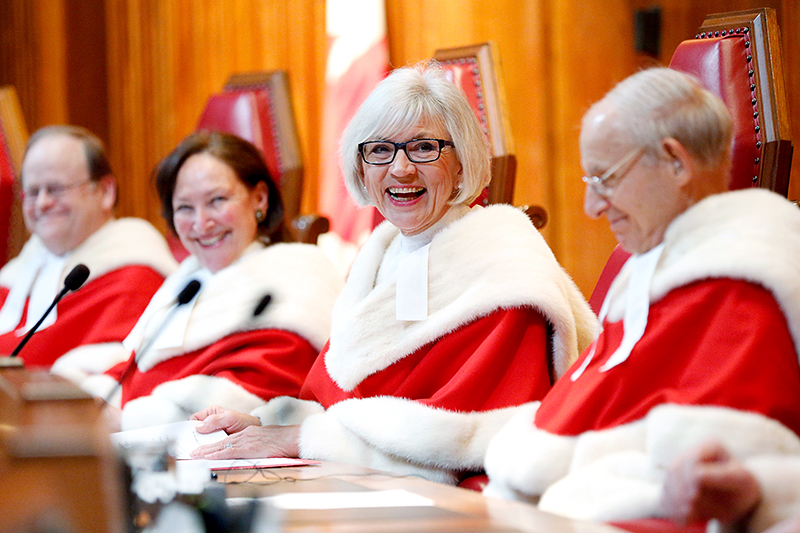When she retired in 2017, Beverley McLachlin, '65 BA, '68 LLB, '91 LLD (Honorary), was the longest-serving chief justice in Canadian history. Her legacy is formidable: she sat for more than 1,000 appeals and contributed prescient, clear-minded opinions in 252 of them. Her opinions have been lauded for the clarity they bring to the Charter of Rights and Freedoms, which outlines the Canadian brand of democracy, subject to the reasonable limits of the law.
We asked lawyers and judges what they view as the most important Supreme Court rulings involving McLachlin.
 Chief Justice Catherine Fraser, '69 BA, '70 LLB, '13 LLD (Honorary), Chief Justice of Alberta
Chief Justice Catherine Fraser, '69 BA, '70 LLB, '13 LLD (Honorary), Chief Justice of Alberta
"The McLachlin era has shaped the law as we know, practise and live it. Her fingerprints are all over the most important judgments of the Supreme Court in the charter era. McLachlin always had a strong sense of where to draw constitutional dividing lines and other dividing lines, too, in the battlefields of social policy. She is able to see just past the legal horizon to things others cannot yet see, not only where the law now is but where it should be going. The prodigious quantity of her work is matched by its quality. Many have a favourite case or sentence from one of her judgments. Mine is three words - a sentence fragment - from R vs. McIntosh (1995). She captured the very essence of why, in a democracy, we have laws: 'Life is precious.'"
 Justice Sheila Greckol, '74 BA, '75 LLB, Alberta Court of Appeal
Justice Sheila Greckol, '74 BA, '75 LLB, Alberta Court of Appeal
"Justice McLachlin was a visionary. She conceived that social, historical and legal context ensures impartiality. Contextual decision-making took hold: in Gladue (1999) and Ipeelee (2012), her court required sentencing judges to consider the historical disadvantages, wrought by colonialism, of Indigenous offenders. In PHS (2011), constitutionalizing safe injection sites, she described tragic antecedents of habitual drug users, concluding: '…these people are not engaged in recreational drug use: they are addicted.' Prescient. Imaginative. Wise."
 Dan Chivers, '97 BCom, '04 LLB, partner at Pringle Chivers Sparks Teskey
Dan Chivers, '97 BCom, '04 LLB, partner at Pringle Chivers Sparks Teskey
"Former chief justice McLachlin, long known for being a unifying force within the court, is a strong leader who left a legacy of numerous 'by the court' decisions, often penned by her. One of these decisions, Canada vs. Bedford (2013), stands as one of her most prominent cases, in which the unanimous decision by the Supreme Court expanded protections under Section 7 of the Charter of Rights and Freedoms. This decisionprevented the possibility of any law that would allow for inequality and unsafe work environments for sex workers. Bedford remains as a lasting example of McLachlin's ability to unify the court and her willingness to challenge Parliament where necessary."
 Rose Carter, '78 BA, Queen's Counsel, partner at Bennett Jones LLP
Rose Carter, '78 BA, Queen's Counsel, partner at Bennett Jones LLP
"In my practice area of health law, the significant 2015 decision of Carter represents a sea change. It meant certain categories of Canadians were given the right to engage medical assistance in dying. The Supreme Court of Canada decision has allowed scores of Canadians to die at a time of their choosing providing certain criteria are met. McLachin helped to set the stage for this significant change to the law in her dissent in the 1993 Rodriguez decision.Sue Rodriguez, terminally ill with ALS, wanted the right to end her life with assistance. In her dissent, Justice McLachin stated that the suicide section of the Criminal Code infringes the right to security of the person included in the charter. She wrote: 'Parliament has put into force a legislative scheme which makes suicide lawful but assisted suicide unlawful. The effect of this distinction is to deny to some people the choice of ending their lives solely because they are physically unable to do so.'"
 Justice Ritu Khullar, '85 BA(Hons), Alberta Court of Appeal
Justice Ritu Khullar, '85 BA(Hons), Alberta Court of Appeal
"My favourite two McLachlin-penned decisions were both released in 1999. They represent the high-water mark of human rights jurisprudence from the Supreme Court of Canada. The first, Meiorin, provides a clear articulation of the meaning of discrimination, in particular when otherwise seemingly neutral rules have a discriminatory impact. Meiorin also explains the obligation on employers or service providers to accommodate someone who has experienced the discrimination to the point of undue hardship. The second, Grismer, emphasizes that human rights assessment focuses on the individual, the actual impact on them arising from discrimination and accommodation."
 Neena Ahluwalia, '80 BA(Spec), '83 LLB, Queen's Counsel, senior manager at Alberta children's services
Neena Ahluwalia, '80 BA(Spec), '83 LLB, Queen's Counsel, senior manager at Alberta children's services
"As a law student, I was taught that today's dissenting opinion may become tomorrow's majority decision. That was true in 1993 when McLachlin dissented in Rodriguez vs. British Columbia. In a close decision, the court upheld the provisions. In 2015, the court stated underlying the rights of liberty and security of the person are the dual concerns 'for the protection of individual autonomy and dignity. Liberty protects the right to make fundamental personal choices free from state interference. Security of the person encompasses a notion of personal autonomy.' In her dissent in Rodriguez, McLachlin clarified the role between the court and parliament: the court must determine whether a law is constitutional as a law, not as a defensible piece of public policy. She wrote, 'If a law offends the charter, this Court has no choice but to so declare. … The focus is not on why Parliament has acted, but on the way in which it has acted.' These remarks foreshadow cases her court took on that challenged executive power, that forged ahead on charter rights, that protected and recognized Aboriginal title and protection of access to justice. It's difficult to point to just one case and say, 'this one made a big impact.' But Rodriguez was a harbinger of what was to come."

We at New Trail welcome your comments. Robust debate and criticism are encouraged, provided it is respectful. We reserve the right to reject comments, images or links that attack ethnicity, nationality, religion, gender or sexual orientation; that include offensive language, threats, spam; are fraudulent or defamatory; infringe on copyright or trademarks; and that just generally aren’t very nice. Discussion is monitored and violation of these guidelines will result in comments being disabled.